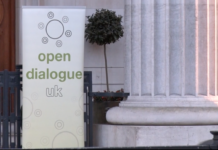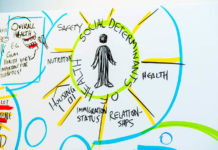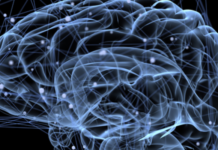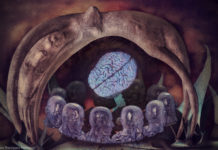Case Study of Liberation Approach to International Mental Health Care
Study in Brazil demonstrates how the exploration of contextual determinants of distress in mental health care can inform therapeutic change.
Mental Health Recovery Narratives Play Central Role in Trauma-Informed Care
New research synthesizes insights from 45 studies to construct a conceptual framework relating different elements of recovery narratives to trauma-informed approaches to care.
More to Happiness Than Feeling Good, Study Finds
Cross-cultural data suggest that happiness involves feeling the emotions one deems as right, in accordance with personal and cultural values.
Traditional South African Healers Use Connection in Suicide Prevention
Study finds that traditional healers in South Africa, whose services are widely used by the country’s population, perform important suicide prevention work.
Valuing Posttraumatic Growth in Psychosis
Individuals who experience psychosis can also experience posttraumatic growth, which can be a central component of the recovery paradigm.
Research Shows Mindfulness can Decrease Anxiety
A new study explores the impact of a Mindfulness-Based intervention on stress-related biomarkers in individuals diagnosed with Generalized Anxiety Disorder (GAD).
Love is Dialogical: The Open Dialogue UK International Conference and Training
In the past five years, there has been a dramatic explosion of interest in the Open Dialogue Therapy practiced in Tornio, Finland. It is a humanistic “treatment” that has produced five-year outcomes for psychotic patients that are, by far, the best in the developed world, and there are now groups in the United States, Europe and beyond that are seeking to “import” this care. However, the challenges for doing so are many and, last month, Open Dialogue UK - on the occasion of the first-ever fully recognized Open Dialogue training outside of Tornio - organized a conference in London to hold an open dialogue about Open Dialogue.
How Feedback Can Improve Psychotherapy Treatment
Researcher examines the impact of client feedback and progress assessment on improvement in outcomes.
Can a Conceptual Competence Curriculum Bring Humility to Psychiatry?
Training for conceptual competence in psychiatry provides a new way forward to address theoretical and philosophical issues in mental health research and practice.
Researchers Present Structural Competency Training Model for Psychiatrists
Researchers argue that a structural competency and social determinants of health approach must be made central to psychiatry training.
Parachute NYC Peer Support Program Presents Challenges and Opportunities
Anthropologists study Parachute NYC to identify challenges and opportunities for implementing peer support and Open Dialogue practices.
What Are Best Practices For Psychosis And What Gets In The Way?
Research investigates clinicians’ perspectives on best care practices and the complicated realities of providing care in the face of agency limitations and mechanized interventions.
Researchers Question the Utility of an ADHD Diagnosis
A new article examines the usefulness of the ADHD diagnosis and suggests alternatives
Neuroscience-based Treatment Program Proposed for Adolescent Depression
A study published in Frontiers in Human Neuroscience proposes a new model for the treatment of adolescents diagnosed with major depressive disorder (MDD).
Psychology Must Become a Sanctuary Discipline to Heal Racial Trauma
Researchers explore pathways of healing racial trauma in Latinx immigrant communities.
Filling the Crack in the Liberty Bell
Instead of an echo-chamber conference, in which treatment “experts” present to other treatment providers, and those with lived experience gather in their own rooms, the ISPS-US conference allowed for the clash of diverse opinions, which could sometimes amalgamate into something greater than the sum of its parts.
How Relational Therapy Enhances a Sense of Self and Relationships
Relational therapy can be informed by the intersubjective dynamics observed in early childhood to facilitate the development of healthy relational patterns and a strong sense of self.
Study Highlights Importance of Social Interactions in Psychosis Recovery
Study finds frequency of social interactions predicts long-term remission in first-episode psychosis.
Beyond Critique: Psychologists Discuss Diagnostic Alternatives
The Journal of Humanistic Psychology compiles diverse research offering diagnostic alternatives toward a paradigm shift in mental health care.
The Concept of Schizophrenia is Coming to an End – Here’s Why
From The Conversation: Many researchers are beginning to acknowledge that the concept of "schizophrenia" as a discrete, hopeless, and deteriorating brain disease does not exist. In...
Speaking, Not Texting, May Prevent Dehumanization in Disagreements
Researchers found participants were less likely to dehumanize those with whom they disagreed when they heard their voices.
Psychologists Argue for Decolonial Approach to Global Poverty
Individualist psychological models of poverty pathologize poor communities, decolonial approaches that emphasize context and interdependence may be more sustainable.
How Does Mindfulness Work?
A new study explores how mindfulness impacts self-compassion and meaning in life to increase mental health and wellbeing.
Childhood Adversity Influences Levels of Distress in Voice Hearers
Research finds that hearing negative voices explains how childhood adversity is related to distress.
Researchers Explore Sexuality and Gender in the Context of Psychosis
Nev Jones and a team of researchers examine how sex, sexuality, and gender-related content are underexplored in contemporary research on psychosis.

































